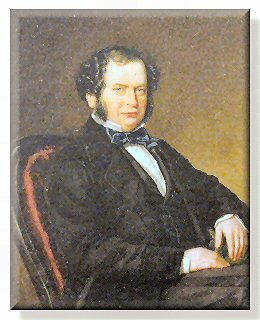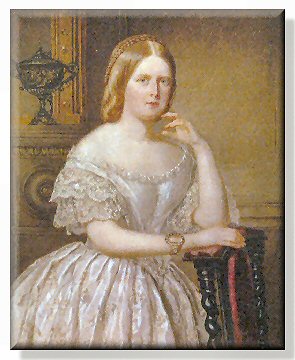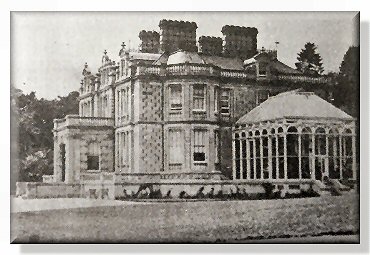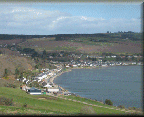The Fletcher family, which owned the Rosehaugh estate after the Mackenzies, were significant benefactors to the village.
James Jack (later Fletcher)

James Jack was born in Elgin in 1807. It is said his father, William Jack, originated from Avoch, but no records survive to confirm this. Along with his brothers, he attended Elgin Academy and received what the Elgin Courier described at the time as an “excellent education”. Three of the boys, James, John and Charles, showed business acumen, and left Elgin to apply their skills in Liverpool. John and James founded a trading house in Liverpool , and became involved in the importing of alpaca – a wool of long silken fibres. Alpaca are of the camel family and live on the slopes of the Andes of South America. The wool of the alpaca was used to produce a lustrous cloth, which in the 1830s was fashionable and in great demand.
While John remained in Liverpool, James travelled to South America to build up trade. James returned in 1845. During a visit to Elgin in 1846, he donated a number of items from Peru to the Elgin Museum – a case of 12 Peruvian birds, two dressed figures, six specimens of gold, and various other items. Only three of these remain.
James’ and John’s wool trade continued to flourish, and there is evidence they traded in llama and vicuna wool too.

In 1852, James married Frederica Mary Stephen in London. Frederica was the widow of Lieutenant Alexander Macleod Hay of the 58th regiment who had died in 1849. In the years following the birth of her last child, Frederica’s health gave cause for concern and she died in 1863, two years before James bought the Rosehaugh estate.
Both James and John changed their name to Fletcher in 1856. Their mother had died in 1855 and had specified in her will that they should change their names from Jack to Fletcher, which the sons duly did. A notice in the London Gazette of the time noted that “The Queen has been pleased to give and grant unto James Jack…. Her Royal licence and authority that he….shall henceforth assume the name of Fletcher, instead of that of Jack”.
As the years progressed, James’ business acumen did not diminish, but rather gained momentum. Not only did he remain in control of his world-wide merchant business in Liverpool, but he also embarked on a series of land acquisitions in the Black Isle and in Forfarshire.
Amongst these acquisitions was that of Rosehaugh estate. James bought the estate from James John Randall Mackenzie of Scatwell in 1865 for £145,000. Immediately on taking over ownership, James embarked on schemes of reclamation and improvement on a massive scale, employing Alexander Ross, an Inverness architect to alter the house. The old building was completely encased, with the additions of a porch and conservatory.

The photo shows the house in c 1880 with Alexander Ross’s changes having been made. James’ improvements were mainly planned with the long term benefits in mind. Up till that time, the village of Avoch had been divided between the two estates of Avoch and Rosehaugh, with neither landowner taking responsibility for the dreadful living conditions of the people, who were desperately poor. The village was left without the most basic of facilities. Under the sole ownership of James, sanitary arrangements were improved, and a street scavenger employed from 1881. Street water pumps were installed and gas street lighting was switched on in 1885. Seven years prior to this, James had sold most of the village to the occupiers while retaining the feus.
There were few aspects of the village life in which James did not become involved. He donated a stained glass window to the Parish Church after it was badly damaged by fire, and he provided a site for the new free church to be built. He built a school and schoolhouse at Killen, and barely two months before his death, he was invited to lay the foundation stone of the new Elgin Academy to which he had contributed.
At the age of 60, now a widower, James was left with the task of bringing up a young family of five, with ages ranging from 9 to 14. The education of his sons was his priority, and Eton his choice. Alfred was the first to attend, followed by James Douglas (later to inherit Rosehaugh House), and Fitzroy Charles. Edward Stephen required special care and attention throughout his life and did not attend Eton.
Of the five children, James Douglas Fletcher showed the greatest potential, achieving reasonable success at Eton, and going on to Baliol College, Oxford. It was inconceivable that James Fletcher would have left his considerable wealth in young and inexperienced hands – so both James Douglas and Fitzroy Charles spent a period on the estate under the guidance of their father.
James died unexpectedly on 1 October 1885. He was due to have turned on the village’s new gas street lighting on 30th September 1885, but felt unwell and died the following day. His total estate amounted to more than £1,394,000. The photo shows the Fletcher family burial enclosure in Avoch.

